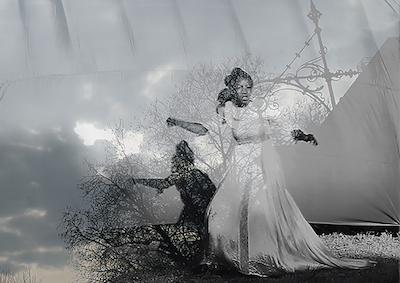“Africans are supposed to be real and you get into a situation where the imaginary becomes the luxury of the bourgeois.”—Jean-Pierre Bekolo
Cameroonian writer-director Jean-Pierre Bekolo has never accepted the narrow expectations that the West places on African filmmakers. Indeed, he actively defies labels, mashing up genres and styles across a body of work that feels deeply grounded in the local even as it takes flight on visionary wings. An intoxicating swirl of magic and technology, folklore and genre, sensuality and politics energizes all of his work, from his debut feature Quartier Mozart (1992) to his biggest international hit The Bloodettes (2005) to the spellbinding Afrofuturist experimentation of Naked Reality (2016). In rejecting Western concepts of realism, Bekolo’s films are nevertheless deeply engaged with transforming material and political reality. It’s a stance summed up by the provocative on-screen question that concludes the futuristic action-horror fusion of The Bloodettes: “How can you watch a film like this and do nothing after?” Bekolo cut his teeth in the 1980s as an editor with Cameroon’s national television station and directing music videos before studying with film semiotician Christian Metz at the Institut National de l’Audiovisuel in Paris. Returning to Cameroon under the influence of Melvin Van Peebles, Charles Burnett and Spike Lee and riding the optimism that suffused independent film in the 1990s to direct his first feature, Bekolo was only 25 when Quartier Mozart found international distribution after premiering at Locarno. When the possibilities of the 1990s proved as illusionary as ever, Bekolo expanded his activities into documentary and academia, engaging widely with aesthetics, political science and philosophy including a four-hour documentary on the work of Congolese intellectual V.Y. Midimbe, author of The Invention of Africa (1988). Currently the 2024 McMillan-Stewart Fellow in Distinguished Filmmaking at Harvard University, Bekolo and his work are receiving renewed attention and the Archive is pleased to have him as a guest for this two-night survey of his work.
Special thanks to our community partners: UCLA African Studies Center, UCLA School of Theater, Film and Television, Villa Albertine.






 Mobile Navigation
Mobile Navigation



